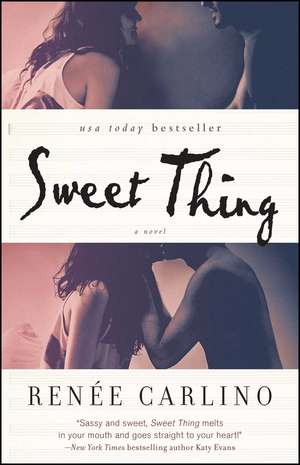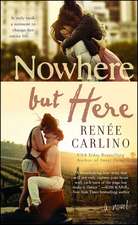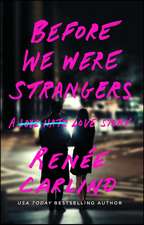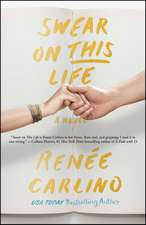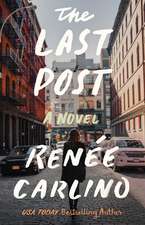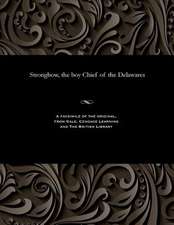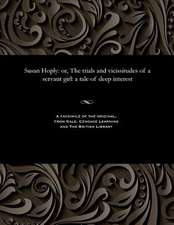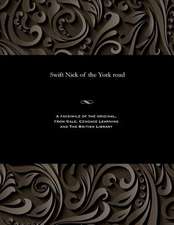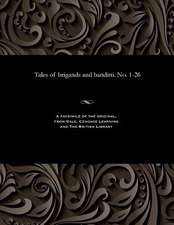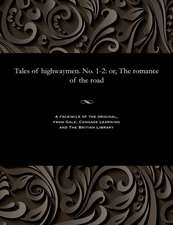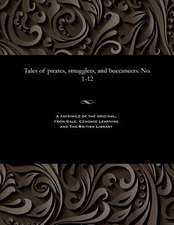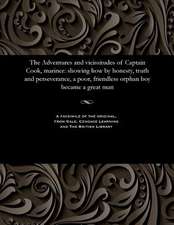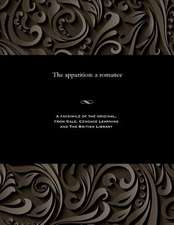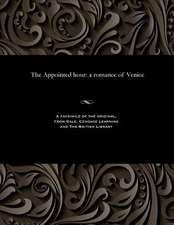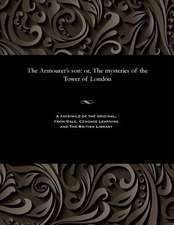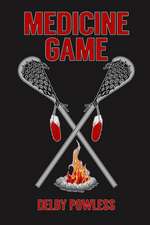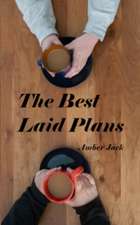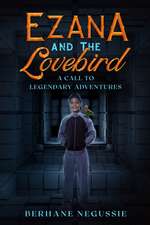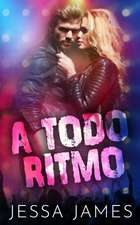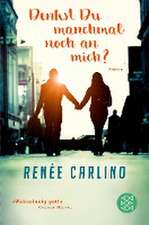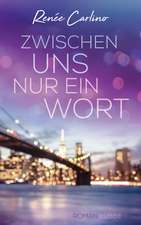Sweet Thing: A Novel
Autor Renée Carlinoen Limba Engleză Paperback – 15 ian 2014
When her father unexpectedly dies, she decides to pick up the threads of his life while she figures out her own. Uprooting herself from Ann Arbor to New York City, Mia takes over her father's café, a treasured neighbourhood institution that plays host to undiscovered musicians and artists. She's denied herself the thrilling and unpredictable life of a musician, but a chance encounter with Will, a sweet, gorgeous, and charming guitarist, offers her a glimpse of what could be. When Will becomes her friend and then her roommate, she does everything in her power to suppress her passions-for him, for music-but her father's legacy slowly opens her heart to the possibility of something more.
A "heart-breaking and romantic" (Aestas Book Blog) debut, Sweet Thing explores the intensity and complexities of first love and self-discovery.
Preț: 102.44 lei
Nou
Puncte Express: 154
Preț estimativ în valută:
19.60€ • 20.61$ • 16.20£
19.60€ • 20.61$ • 16.20£
Carte disponibilă
Livrare economică 26 martie-09 aprilie
Preluare comenzi: 021 569.72.76
Specificații
ISBN-13: 9781476763934
ISBN-10: 1476763933
Pagini: 320
Dimensiuni: 135 x 210 x 23 mm
Greutate: 0.27 kg
Editura: ATRIA
Colecția Atria Books
ISBN-10: 1476763933
Pagini: 320
Dimensiuni: 135 x 210 x 23 mm
Greutate: 0.27 kg
Editura: ATRIA
Colecția Atria Books
Notă biografică
Renée Carlino is a screenwriter and the bestselling author of Sweet Thing, Nowhere But Here, After the Rain, Before We Were Strangers, Swear on This Life, and Wish You Were Here. She grew up in Southern California and lives in the San Diego area with her husband and two sons. To learn more, visit ReneeCarlino.com.
Extras
Sweet Thing
Airports are the great human distribution factories, and people-watching here can provide a writer with infinite possibilities. Every second there is a new, brief snapshot of humanity; it’s an endless stream of fodder. In fact, next to me in the security line at this very moment is a Tibetan monk, standing perfectly still and wearing his patience like a mask; a mother discreetly nursing her baby; and a marine, looking sharp and prideful in his best dress blues. I wonder where they are headed today and for the rest of their lives. I wonder if I can discover something unique and worth writing about by simply observing them in line. As I watch, I think about the imagery I will create, the picture I want to paint. I imagine colorful words dancing across the page. My hand twitches from the desire to jot down the details pooling in my head.
“Do you need a hand?”
I’m jolted out of my trance and realize my kids are bouncing around, the security agent is barking, I’m holding up the line, and we’re all still wearing our shoes. Shit.
The face belonging to that voice looks to be that of a woman in her midtwenties; her long dark hair is pulled back into a flawless ponytail. She’s dressed in what I would call monochromatic collegiate wear; basically she looks like a Gap ad, and she’s holding a little gray bin with her shoes and belongings nestled perfectly inside it. The dark eyebrows that frame her big, round, hazel eyes are arched, waiting for my response.
“Yes! Please! Will you grab his shoes?” I point to my three-year-old son. “Would you mind carrying him up there for me?”
“No problem.”
On the other side of the metal detectors I study the girl while we put shoes on the boys.
“What’s your name, kid?” She has a fairylike voice, but her choice of words is anything but.
“Cash.”
“Cool name,” she says and appears to truly mean it. “I’m Mia—nice to meet you.”
“I’m Hayden!” shouted my four-year-old.
“I like your name, too.”
I stand up and introduce myself. “Hi, Mia, I’m Lauren. Thanks for your help. Corralling kids at an airport can be crazy.”
I inspect her appearance and feel unusually drawn to her. She’s thin, fit, her skin vibrant and her face calm. I see something in her that resembles the me of ten years ago. She’s so put together, just like I was at that age; it’s those few years right before the real world gives you a swift kick in the ass. I thought about cutting my head open and spilling the contents into hers so she could skip over the impending crap I knew she would soon face. The problem with that idea is that wisdom is not the same as information; it’s something entirely different. It’s often mistaken for good advice, but wisdom cannot be imparted to someone. Wisdom can only be earned; it’s a by-product of experience, not necessarily knowledge, otherwise I would be stalking Oprah right now, begging for a transfusion.
Maybe your early twenties are about wearing daisy dukes, withdrawing from a zillion college courses, changing your major five times, one-night stands, alcohol poisoning, having sex with your neighbor while his girlfriend watches, dating a distant cousin, cocaine, bad credit, or bad eye shadow. Either way, by twenty-five most of us start thinking about other things. The big questions: What do you want to do with the rest of your life? Who will you marry if you marry at all? What career will you choose? Do you want children? It seemed like everything I knew at twenty-five morphed into everything I didn’t know by twenty-six, when I was suddenly hit with the realization that many of the decisions we make in our twenties are permanent.
Those decisions seem easy for some and, sure, you could say those people are just the shallow puddles we trudge through, but I would argue that those people are lucky because right now as I watch this girl—the past me—looking serenely self-possessed, I know that she is standing on a great precipice. I can tell by looking at her that she is the still water you only ever skip rocks over. The world as she knows it is about to be turned upside down, and if she doesn’t learn to swim, her own depth will drown her. I feel a strong desire to whisper “surrender,” but I don’t. Like everyone in this airport, she is headed somewhere, possibly the first stop on that brutal journey of self-discovery. Like the rest of us, she will have to learn the hard way that we are not always in control. Sometimes it takes the love of others to show us who we really are.
Navigating an airport with two small children is no easy task, and before I get on that plane, I’ll wonder if I packed enough snacks, if the DVD player is charged enough, or if I’ll have enough energy to rock my thirty-pound toddler in the space between the smelly lavatory and flight attendants’ station. As I chase my kids around, trying to squeeze Benadryl into their tiny mouths, I wonder if the decisions I made in my twenties were right for me. Will my marriage endure the test of time? Am I a good mother, wife, writer, neighbor, dog owner? Then I remember the journey that brought me to those decisions, and that memory gives me great solace, because the memory is a reminder of who I am among all the chaos that is life.
Before I head to my gate, I look over at Mia and wonder what she thinks of me, all frazzled and disheveled with food stains on my clothes. I wonder if she knows that sometimes we figure things out, and then life changes and we have to figure it all out again. I’m sure she’ll learn that soon enough, and I’m sure she’ll have her own story to tell. . . .
Sweet Thing
The airport security agent was losing his patience. “Ma’am, I said you need to remove your shoes and place them into the bins.” She wasn’t intentionally ignoring him; she was preoccupied—well, more like staring into space. If we were graded on how efficiently we removed our belongings in order to place them in those little gray bins, I would have gotten an A-plus. The woman in front of me, however, was failing miserably. Her two children were running around, screaming like banshees, while she appeared to be daydreaming.
I tapped her shoulder lightly but she didn’t respond. Finally I cleared my throat and said, “Do you need a hand?” I figured I might as well since I wouldn’t be going anywhere until she did.
She mouthed the word shit, then said, “Yes! Please! Will you grab his shoes?” She pointed to a little blond, blue-eyed cherub. “Would you mind carrying him up there for me?”
“No problem.”
I walked up to the little boy, who immediately quieted. I gave him a big smile, then yanked his shoes off and threw them into the bin moving swiftly down the conveyor belt. “Ready, kid?” He nodded and I picked him up and carried him toward the metal detector. The warmth of his little arms around my neck radiated through me. I smiled at him, crossed my eyes, and made a silly face. His giggle sounded like music. I pried his clinging legs and arms from around me to set him down.
We ushered the little boys through the metal detector and then proceeded to collect our things on the other side. I followed her over to the benches to help put shoes back on the boys. “What’s your name, kid?”
“Cash,” he said shyly in his small, squishy voice.
“Cool name.” In fact, it was my favorite. “I’m Mia. Nice to meet you.”
“I’m Hayden!” shouted his dark-haired brother. They were almost identical in height, but Hayden had dark hair and dark eyes.
“I like your name, too,” I said, smiling.
His mom stood up and introduced herself. “Hi, Mia, I’m Lauren. Thanks for your help. Corralling kids at an airport can be crazy.” She let out a long breath.
I noticed that we resembled each other. Same straight, dark hair, fair skin, and hazel eyes. It was eerie. She could have been my sister, or maybe she was me in ten years? There was something different about her, though. Her eyes were sunken and hollow, and she looked exhausted. In that moment I wondered if I would ever be a mother, or if I even wanted to be. I thought maybe if I found the perfect husband—stable, wealthy, business-minded—it could be a possibility, but definitely not in the near future. I decided if I did have children, I would surely have my shit straighter than this lady.
For being all of twenty-five, I was admittedly a bit of a control freak. I actually used to embrace that facet of my personality. I thought being an independent woman who was in control and made decisions with her head and not her heart was evolved. Making the right choices equaled guaranteed success in my mind. Of course, I didn’t know then that my definition of success would change so drastically.
My eyes scrolled down the monitor, searching for flight 25, DTW in Detroit to New York City’s JFK. Failing to remember what gate the clerk had mentioned, I cursed myself. I was nothing if not punctual. Okay, 35B. I walked briskly, passing Lauren and her two kids as she chased them around outside the duty-free. Flying must suck for her. For a brief moment, I hoped we weren’t on the same flight and then I immediately felt guilty for the thought. I decided I’d offer to help if she ended up on my flight, seated anywhere near me, though I’d much rather sleep.
I love flying. It’s an escape for me. There’s nowhere to be; it’s like surrendering to fate. Fate was always such a hard concept for me to understand, but I bought into it when necessary, like on a plane or the subway. When I fly, I allow myself to believe in fate simply because it’s too tedious to worry about whether or not the pilot is pouring whiskey in his coffee. I let everything go when I fly, just like when I play the piano. It’s the closest I get to religion; it’s the closest I get to faith.
I’d have no one to answer to for a couple of hours and I was looking forward to it. I promised myself I wouldn’t think about anything. I wouldn’t worry about what I would do with my father’s apartment, his belongings, the café, or pretty much anything else my father owned in New York. I would just get out there and continue living his life until I could figure out what to do with my own.
When my father had passed away suddenly a month before from a heart attack, I’d been devastated. Although I’d grown up in Ann Arbor, essentially raised by my mother, Liz, and stepfather, David, whom I referred to as Dad, I was still very close to my biological father, Alan Kelly. I’d spent summers in New York, helping out with his café, hanging with the then-bizarre East Village crowd. My father was the only child of Irish immigrants. His parents had given him every last penny to open Ave. A Café in the East Village in 1977, renamed Kelly’s Café in ’82, and then finally renamed again to simply Kell’s in ’89. In the ’70s it was the ultimate hangout for any troubadour and trobairitz alike. It was, and remains, a place with a liberal and artistic vibe, something my father practically exuded directly from his pores. It would be bittersweet to be back there.
I made it to my gate on time. There was no sign of Lauren. I breathed a sigh of relief and then directed a brief request to the universe asking that it seat a tired, antisocial traveler next to me. I boarded and found my seat quickly. I threw my bag in the overhead bin, sat down, and began my preflight ritual: super fuzzy socks on, earbuds in, Damien Rice on the iPod, travel pillow around the neck. I was ready. The window seat remained empty as the last few passengers came on board. I had a ridiculous grin on my face, prematurely thanking the universe for leaving the seat empty until I glanced up and saw a guy headed toward me. I have to admit, he was gorgeous, but as soon as I saw the guitar case, my stomach turned sour.
Oh no, please, world, do not let this egoist, wannabe, probably smelly musician sit next to me.
As he approached, he blurted out, “Hey!” Pausing, he looked right into my eyes and said, “Do you want the window seat? It’s all yours if you do.”
“Huh? Uh, no thanks.” What the hell is this guy doing?
“I’m a terrible flier,” he said, hesitating. “Please, I need to be in the aisle, I’m sorry, do you mind? I’m Will, by the way.”
Moving to the window seat, I mumbled, “Yeah, fine, you can sit there. I’m Mia.” I stuck my hand up in a motionless wave, intentionally avoiding a handshake.
Don’t get me wrong, I love music; I live for it. I’m classically trained on the piano and I can hold my own on almost any instrument. Growing up in Ann Arbor, it seemed like every kid played the piano or the freakin’ cello, but I had a knack for music in general, much of which I owed to my father. During the summers in New York, he exposed me to world music, rock and roll, blues, jazz, you name it, then I would go home and work on Rachmaninoff’s Opus 23 all winter long. Playing the piano the way I was taught, combined with the loose methods my father encouraged during those summers, always created this blend of discipline and revolution in my style. I tried to embrace the blend, but sometimes it felt like a conflict.
I believe my mother was drawn to my father’s love of music, his free spirit and beatnik ways, although she would never admit that. She referred to what she had with him as one wild week for a very naive nineteen-year-old. It was the summer of 1982 and she had been in Cape Cod on a family vacation when she and a couple of friends decided to take a day trip to New York. One day turned into five, and my mother returned to Cape Cod knocked up. My father owned it from the beginning, but my grandparents wouldn’t allow their teenage daughter to move to New York, unmarried and pregnant. As I got older, I wondered why my father hadn’t followed my mother to Ann Arbor. I knew he wanted to take responsibility for me and I knew he cared for my mother, but I don’t think he was ever a one-woman kind of man. His lifestyle was so far removed from anything that resembled traditional domesticity.
After I was born, we lived with my grandparents while my mother attended the University of Michigan, eventually acquiring a law degree. That’s where she met David, and they’ve been inseparable ever since, even practicing law at the same firm. I think my stepdad provided my mother with the sense of stability that my father couldn’t, or wouldn’t. I admired David for that. He treated me like his own, and even though I sometimes disagreed with him, especially as a teenager, I always felt loved by him.
In the beginning my father would come visit me for long weekends here and there until I was old enough to travel to New York for the summers. He and David had an enormous amount of respect for each other, even though they couldn’t have been more different. What they had in common was an unconditional love for my mother and me. After my father became aware of the fact that I called David “Dad,” he simply said, “He is your dad, luv, just like me, but to keep it straight, why don’t you call me Pops?” And so I did.
My mother’s group of androgynous, pseudointellectual friends would have referred to me as the ultimate indiscretion if it weren’t for the fact that I was gifted musically, valedictorian of my class in high school, and now an Ivy League graduate. Choosing a business major over the arts at Brown was a surprise to everyone, but I yearned for a more organic experience when it came to music. I didn’t want to spend one more minute trudging through a Bach piece while being hypnotized by the metronome. I wanted a degree I could use and I wanted music to be my hobby. I was still wondering how I was going to use that degree. . . .
I had shut the window screen, my eyes, and brain off to the world when I was jolted by the weight of my own bag being tossed onto the seat next to me. My eyes darted open and up to Will, who was forcefully rearranging everything in the overhead bin.
“Sorry, baby, I’ve got to make room for her,” he said, grabbing his guitar and hoisting it up.
I rolled my eyes at the thought of him personifying his guitar. He grabbed my bag, shoved it in the bin, and collapsed into his seat. I shot him a slightly annoyed look. “Why didn’t you request an aisle seat?” I asked.
“Well, you see, sweetheart, I like to be right behind the emergency exit. I’ll hop over this seat in front of me, jump out the door, and be down that super slide in a split second,” he said with a self-satisfied smile.
“Then why not request the exit aisle?”
“I am not the person for that job, trust me.”
“Damn, chivalry is dead. It doesn’t matter anyway; our lives are in the hands of these hopefully sober pilots and this nine-hundred-thousand-pound hunk of metal, so . . .”
“Can we stop talking about this? I don’t think you understand.” He pulled a rosary out of his pocket and proceeded to drape it around his neck.
“Something tells me you have no idea what that’s for,” I said, giggling. “Are you Catholic?” He was desperately trying to peel a tiny price tag off one of the beads. “Oh my god, you bought that in the airport gift store, didn’t you?”
Putting his finger to his mouth, he said, “Shhh! Woman, please!” He looked around as if he would be found out. “Of course I’m Catholic.”
A light chuckle escaped me. “Well, God would know, so wearing that around your neck instead of chanting your Hail Marys is probably pissing the big guy off, and that’s not good for any of us.”
He let out a nervous laugh and then whispered, “Hey, little firecracker, you like taunting me, don’t you?” Waiting for my response, he looked directly into my eyes and smiled cutely.
I suddenly felt bashful and shook my head nervously. “Sorry.”
Still smiling, he squinted slightly and then winked before looking away and pulling a stack of pamphlets out of the seatback pocket.
While he reviewed the safety information flyer, we began taxiing toward the runway. I noticed a few things in that moment. One, Will was universally attractive. Even though he dressed a little edgier and had slightly imperfect teeth, he could have easily been a print model. He stood a tad over six feet and was thin with muscular arms, maybe from years of playing guitar. He had brown, disheveled hair and dark eyes, a chiseled jaw, high cheekbones, and great lips. As he read, he mouthed the words, the way a child reads silently.
Two, he didn’t smell bad at all—as a matter fact, he smelled heavenly. A mixture of body wash, sandalwood, and just a hint of cigarette smoke, which would normally repulse me but for some reason it suited him. He wore black pinstriped slacks that hung on his thin hips, a silver-studded belt with a wallet chain, and a red T-shirt that said “Booyah!” above a silk-screened picture of Hillary and Bill Clinton playing ping-pong. I didn’t get it.
Three, he was genuinely scared to fly and it was apparent that he would be white-knuckling it the entire way. I made the decision to try to calm his nerves by being friendly and chatting him up.
The pilot came on and announced we were cleared for takeoff. “Jesus Christ! Did he sound drunk to you?” Will blurted.
“Not at all. Relax, buddy, everything will be fine, and you should probably tone down the Jesus Christs, at least while you’re still wearing that thing.” I pointed to the rosary around his neck. He looked down at the beads like they were about to perform a circus act.
Nervously he said, “Hey, hey, can you open that screen? I need to see us get off the ground.” I obliged as he peered over me and out the window.
“You’re funny, Will. You want to sit in the aisle seat, yet here you are, leaning over me to look out the window.”
Ignoring my comment, he took a deep breath in through his nose, tilted his head to the side, and with a half smile whispered, “You smell good, like rain.” I was totally caught off guard by his proximity; a delicious chill ran through me.
“What kind of guitar do you have?” I asked abruptly, attempting to change the subject.
“Um, an electric guitar?” The answer was like a question.
“No, I know that. What kind?”
“Oh, it’s a Fender.” He squinted his eyes and smiled. He seemed somewhat charmed and probably grateful that we were talking about guitars while the plane was barreling full speed down the runway. He gripped the armrest, still not totally at ease.
“Is it a Telecaster, Stratocaster . . .?”
“As a matter of fact, it’s a blond Tele. I also have a Gibson acoustic and a vintage Harmony at home.”
“I love the old Harmony guitars. On my fifth birthday my father gave me his H78. It was the first guitar he bought with his own money. He ordered it from a Sears catalog in 1970.”
His eyes shot open with surprise. “That’s awesome. Your father must be a cool guy.”
“He just passed away a month ago.”
“Shit . . . I’m so sorry,” he said with genuine sympathy.
“It’s okay, but I’d rather not talk about it right now. Let’s talk about guitars,” I said, realizing it would be for both our benefits.
When we hit cruising altitude, he relaxed a little and began describing the magical pickups on the Harmony and the modifications he’d made to the Telecaster. He clearly knew what he was talking about, and I found his enthusiasm sweet.
We continued into an easy conversation about our favorite musicians. We agreed on everything from Led Zeppelin to Bette Midler. We talked about Miles Davis, Joni Mitchell, Debussy, the Niazi Brothers, and Edith Piaf. It was the most intense and diverse musical conversation I’d ever had. We talked nonstop for the entire length of the flight.
I told him about my musical background and also how I was going to live in my father’s apartment with my yellow Lab, Jackson, and run my father’s café, and maybe teach piano lessons on the side. He told me how he was working as a bartender in a swanky boutique hotel lounge in SoHo. He said at the moment he was literally living in a storage closet in Chinatown until he could afford an apartment. He was playing guitar in a band that he wasn’t too excited about. Between practice and his job and the few gigs they played a month, he was never home.
I thought about the spare bedroom in my dad’s apartment for a second and then pushed the idea out of mind when I reminded myself that Will was a complete stranger. Even though I found his neuroses more endearing than scary, I figured inviting a struggling musician to live with me was not the best idea.
As the plane started to descend, Will gripped the armrest. “Mia, we’re going down. I need to know everything about you right now! How old are you, what’s your last name, what street do you live on? If we make it out of this, I think we should jam together, you know, musically or whatever.”
He was being adorable. My body tingled with warmth from his gaze. I shifted nervously before answering, “My last name is Kelly, I’ll be at my father’s café most days—Kell’s on Avenue A. Come and have a coffee with me sometime and we’ll talk music. Oh, and I’m twenty-five.”
When we were safely on the ground, he smiled sweetly and said in a low voice, “We both have double first names. I’m Will Ryan, twenty-nine. I live at twenty-two Mott Street in the storage closet. I work at the Montosh. I’m O negative, you know, the universal one, and I play in a band called The Ivans. Oh, and I love coffee. It was nice to meet you, Mia.”
“It was nice to meet you, too.” I genuinely meant it.
“We made it,” he said, pointing out the window as we taxied to the gate. “You know they say people who have stared death in the face are bonded for life?”
I laughed. “You’re cute, Will.”
“I was going for irresistible,” he said with a brazen smirk. He handed me my bag and let me go in front of him. His warm breath on my neck caused me to shiver and stumble in the aisle. He chuckled. “You’re cute.” When another passenger jetted out of his seat, bumping me, Will blurted out, “Hey! Watch it, buddy!” I turned around to see his sexy smile. His lips flattened, he narrowed his eyes, and then whispered, “See, baby, chivalry isn’t dead.”
When I stepped out into the crisp March, New York air, I sensed him walking behind me, but I didn’t turn around. Luckily there wasn’t a cab line, so I got one right away, hopped in, shut the door, and shouted, “Alphabet City, Manhattan!” As we pulled away from the curb, I glanced over at Will. He was blowing a lungful of smoke into the air with curiosity in his eyes, like he was listening to God. His gaze met mine and with an exaggerated wave he mouthed the words, Good-bye, Mia. I thought I caught the words “sweet thing” falling from his lips just as he left my view.
As the cab wove in and out of traffic, I couldn’t get my mind off him. The entire flight I didn’t think once about my future, my father’s apartment, or the café, and I don’t think Will worried much about the possibility of crashing. We kind of hit it off; in fact, we did hit it off. He had this silly—to the point of being honest—quality about him. When I thought about our conversation, I remembered how he called Pete, the lead singer of The Ivans, the world’s biggest douche bag. It was clear to me that Will was in a band for the love of music and not for fame or sex; I was sure he didn’t need any help in that department. I knew there was something about him that drew me in, but I convinced myself at that moment that Will was not boyfriend material—not in my book, anyway. I thought maybe we could be friends; after all, I didn’t have many in my new city.
The last time I had been in New York was for my father’s funeral one month before. I knew I had my work cut out for me, which gave me a rush of anxiety. I needed to sort through Pops’s things and make room for my own. As I made my way through the door leading to the stairwell, I stopped at the mail slot and slipped my key in but could barely turn it from the amount of mail jammed in the tiny box. I managed to shove the massive pile under my arm and carry the rest of my things up the stairs to the landing. I set my bags down and searched for the right key. I tried five keys before finally unlocking the door. It occurred to me that the giant key ring was one of a handful of discoveries I would make about my father.
The first thing I noticed when I entered the apartment was that it was very clean. Someone had been there, probably one of the two regular women in my father’s life. Either Martha, who was like a sister to him—she also ran Kell’s—or Sheil, who was his on-and-off girlfriend. Both women had been in Pops’s life for decades and both were like family. They were going to be lifelines in the months to come as I ventured through my father’s belongings and his story.
After tossing out a large amount of junk mail, I sifted through a few financial statements and bills before I got to a letter from the probate lawyer. I leaned over the kitchen counter, closed my eyes, and inhaled deeply before opening it. My father’s scent was still somehow wafting through the still air in the apartment, as if the residual effects of living were reminding me that at least his spirit was alive. My eyes welled and my heart ached over his loss. I committed his smell to memory, a mixture of espresso, petula oil, and hand-rolled clove cigarettes that had imbued every article of clothing he owned with a combination of earthy spice and sweetness. I smiled slightly at his somewhat painful memory and then addressed the task at hand.
In the days following my father’s heart attack, my mother and David had put their lives on hold to follow me to New York to make arrangements. That week was a foggy memory, filled with shock and pain, but the ease, grace, and familiarity that my mother displayed through it all was inspiring and intriguing to me. I wasn’t sure if it was born out of her love for me and desire to help when she knew I was hurting, or if it was a deeper love for my father that I hadn’t known she felt. As disjointed as my family seemed growing up, in Pops’s death we were all brought together. Isn’t that how it always is? It was like my mother and Martha were sisters who shared an untold story, each one falling perfectly into a rhythm in the apartment and at Kell’s.
The day before the funeral, we’d worked in the café and I had watched my mother navigate the espresso machine with a certain know-how. “Were you a barista in another life?” I had said to her.
“It’s not rocket science, honey.” She had a natural-born acumen in almost everything she attempted to do. It was a trait I admired, and one I wasn’t sure I had inherited.
My mother and Martha had arranged the funeral while David had taken care of all the legal aspects of my father’s estate. I knew I had to make some decisions but I wasn’t ready at the time, so I had decided to go back to Ann Arbor after the funeral, wrap up my life, and then move to New York for a few months until I could decide what to do. Moving to New York had never been part of my plan before Pops died, but that’s where I found myself now.
Everything regarding his estate was cut and dry. I was the one and only recipient of his assets. However, I knew there would be items that Pops would want Sheil and Martha to have, and I was sure he would have requests regarding Kell’s. When I opened the letter, I knew from the tone and formality that it was something Pops had dictated to his lawyer and then signed. He wanted to be official. Everything financial had already been dealt with in another section of his will. I knew the letter I was about to read would address his personal belongings, along with his hopes and dreams for Kell’s. I skimmed through the logistical pieces in the beginning, obviously added by the lawyer, until I got to the specifics. I braced myself.
Sheil Haryana and Martha Jones shall have access to my apartment to gather their personal belongings, as well as any music, letters, or photographs that pertain to them.
Several moments passed as I studied the sparse document. I ran my index finger under each word, slowly searching for a hidden message, but there was nothing more. It’s all up to me. He left it all up to me. I was shocked by the weight of that news; he’d trusted me with everything he had spent his whole life building. The realization made me miss him even more.
The buzzer rang, startling me out of my daze. I went to the speaker. “Yes?’
“It’s Martha.” I buzzed her in immediately and could hear her bounding up the steps with my four-legged friend. I opened the door and fell to the floor as Jackson pounced on me with the full weight of his front legs.
“I missed you, buddy!” He licked my face and shifted from paw to paw as I scratched behind his ears. I stood up and sank into Martha’s embrace. “Thank you for taking care of him, and Kell’s.”
“Oh, my Mia Pia! It’s so good to see you, sweetheart.” She pushed my shoulders back to study my face. Looking right into my eyes, she said, “We have some work to do, don’t we.”
That was the understatement of the century.
Prologue
Lauren
Airports are the great human distribution factories, and people-watching here can provide a writer with infinite possibilities. Every second there is a new, brief snapshot of humanity; it’s an endless stream of fodder. In fact, next to me in the security line at this very moment is a Tibetan monk, standing perfectly still and wearing his patience like a mask; a mother discreetly nursing her baby; and a marine, looking sharp and prideful in his best dress blues. I wonder where they are headed today and for the rest of their lives. I wonder if I can discover something unique and worth writing about by simply observing them in line. As I watch, I think about the imagery I will create, the picture I want to paint. I imagine colorful words dancing across the page. My hand twitches from the desire to jot down the details pooling in my head.
“Do you need a hand?”
I’m jolted out of my trance and realize my kids are bouncing around, the security agent is barking, I’m holding up the line, and we’re all still wearing our shoes. Shit.
The face belonging to that voice looks to be that of a woman in her midtwenties; her long dark hair is pulled back into a flawless ponytail. She’s dressed in what I would call monochromatic collegiate wear; basically she looks like a Gap ad, and she’s holding a little gray bin with her shoes and belongings nestled perfectly inside it. The dark eyebrows that frame her big, round, hazel eyes are arched, waiting for my response.
“Yes! Please! Will you grab his shoes?” I point to my three-year-old son. “Would you mind carrying him up there for me?”
“No problem.”
On the other side of the metal detectors I study the girl while we put shoes on the boys.
“What’s your name, kid?” She has a fairylike voice, but her choice of words is anything but.
“Cash.”
“Cool name,” she says and appears to truly mean it. “I’m Mia—nice to meet you.”
“I’m Hayden!” shouted my four-year-old.
“I like your name, too.”
I stand up and introduce myself. “Hi, Mia, I’m Lauren. Thanks for your help. Corralling kids at an airport can be crazy.”
I inspect her appearance and feel unusually drawn to her. She’s thin, fit, her skin vibrant and her face calm. I see something in her that resembles the me of ten years ago. She’s so put together, just like I was at that age; it’s those few years right before the real world gives you a swift kick in the ass. I thought about cutting my head open and spilling the contents into hers so she could skip over the impending crap I knew she would soon face. The problem with that idea is that wisdom is not the same as information; it’s something entirely different. It’s often mistaken for good advice, but wisdom cannot be imparted to someone. Wisdom can only be earned; it’s a by-product of experience, not necessarily knowledge, otherwise I would be stalking Oprah right now, begging for a transfusion.
Maybe your early twenties are about wearing daisy dukes, withdrawing from a zillion college courses, changing your major five times, one-night stands, alcohol poisoning, having sex with your neighbor while his girlfriend watches, dating a distant cousin, cocaine, bad credit, or bad eye shadow. Either way, by twenty-five most of us start thinking about other things. The big questions: What do you want to do with the rest of your life? Who will you marry if you marry at all? What career will you choose? Do you want children? It seemed like everything I knew at twenty-five morphed into everything I didn’t know by twenty-six, when I was suddenly hit with the realization that many of the decisions we make in our twenties are permanent.
Those decisions seem easy for some and, sure, you could say those people are just the shallow puddles we trudge through, but I would argue that those people are lucky because right now as I watch this girl—the past me—looking serenely self-possessed, I know that she is standing on a great precipice. I can tell by looking at her that she is the still water you only ever skip rocks over. The world as she knows it is about to be turned upside down, and if she doesn’t learn to swim, her own depth will drown her. I feel a strong desire to whisper “surrender,” but I don’t. Like everyone in this airport, she is headed somewhere, possibly the first stop on that brutal journey of self-discovery. Like the rest of us, she will have to learn the hard way that we are not always in control. Sometimes it takes the love of others to show us who we really are.
Navigating an airport with two small children is no easy task, and before I get on that plane, I’ll wonder if I packed enough snacks, if the DVD player is charged enough, or if I’ll have enough energy to rock my thirty-pound toddler in the space between the smelly lavatory and flight attendants’ station. As I chase my kids around, trying to squeeze Benadryl into their tiny mouths, I wonder if the decisions I made in my twenties were right for me. Will my marriage endure the test of time? Am I a good mother, wife, writer, neighbor, dog owner? Then I remember the journey that brought me to those decisions, and that memory gives me great solace, because the memory is a reminder of who I am among all the chaos that is life.
Before I head to my gate, I look over at Mia and wonder what she thinks of me, all frazzled and disheveled with food stains on my clothes. I wonder if she knows that sometimes we figure things out, and then life changes and we have to figure it all out again. I’m sure she’ll learn that soon enough, and I’m sure she’ll have her own story to tell. . . .
Sweet Thing
TRACK 1: Fledglings
Mia
The airport security agent was losing his patience. “Ma’am, I said you need to remove your shoes and place them into the bins.” She wasn’t intentionally ignoring him; she was preoccupied—well, more like staring into space. If we were graded on how efficiently we removed our belongings in order to place them in those little gray bins, I would have gotten an A-plus. The woman in front of me, however, was failing miserably. Her two children were running around, screaming like banshees, while she appeared to be daydreaming.
I tapped her shoulder lightly but she didn’t respond. Finally I cleared my throat and said, “Do you need a hand?” I figured I might as well since I wouldn’t be going anywhere until she did.
She mouthed the word shit, then said, “Yes! Please! Will you grab his shoes?” She pointed to a little blond, blue-eyed cherub. “Would you mind carrying him up there for me?”
“No problem.”
I walked up to the little boy, who immediately quieted. I gave him a big smile, then yanked his shoes off and threw them into the bin moving swiftly down the conveyor belt. “Ready, kid?” He nodded and I picked him up and carried him toward the metal detector. The warmth of his little arms around my neck radiated through me. I smiled at him, crossed my eyes, and made a silly face. His giggle sounded like music. I pried his clinging legs and arms from around me to set him down.
We ushered the little boys through the metal detector and then proceeded to collect our things on the other side. I followed her over to the benches to help put shoes back on the boys. “What’s your name, kid?”
“Cash,” he said shyly in his small, squishy voice.
“Cool name.” In fact, it was my favorite. “I’m Mia. Nice to meet you.”
“I’m Hayden!” shouted his dark-haired brother. They were almost identical in height, but Hayden had dark hair and dark eyes.
“I like your name, too,” I said, smiling.
His mom stood up and introduced herself. “Hi, Mia, I’m Lauren. Thanks for your help. Corralling kids at an airport can be crazy.” She let out a long breath.
I noticed that we resembled each other. Same straight, dark hair, fair skin, and hazel eyes. It was eerie. She could have been my sister, or maybe she was me in ten years? There was something different about her, though. Her eyes were sunken and hollow, and she looked exhausted. In that moment I wondered if I would ever be a mother, or if I even wanted to be. I thought maybe if I found the perfect husband—stable, wealthy, business-minded—it could be a possibility, but definitely not in the near future. I decided if I did have children, I would surely have my shit straighter than this lady.
For being all of twenty-five, I was admittedly a bit of a control freak. I actually used to embrace that facet of my personality. I thought being an independent woman who was in control and made decisions with her head and not her heart was evolved. Making the right choices equaled guaranteed success in my mind. Of course, I didn’t know then that my definition of success would change so drastically.
My eyes scrolled down the monitor, searching for flight 25, DTW in Detroit to New York City’s JFK. Failing to remember what gate the clerk had mentioned, I cursed myself. I was nothing if not punctual. Okay, 35B. I walked briskly, passing Lauren and her two kids as she chased them around outside the duty-free. Flying must suck for her. For a brief moment, I hoped we weren’t on the same flight and then I immediately felt guilty for the thought. I decided I’d offer to help if she ended up on my flight, seated anywhere near me, though I’d much rather sleep.
I love flying. It’s an escape for me. There’s nowhere to be; it’s like surrendering to fate. Fate was always such a hard concept for me to understand, but I bought into it when necessary, like on a plane or the subway. When I fly, I allow myself to believe in fate simply because it’s too tedious to worry about whether or not the pilot is pouring whiskey in his coffee. I let everything go when I fly, just like when I play the piano. It’s the closest I get to religion; it’s the closest I get to faith.
I’d have no one to answer to for a couple of hours and I was looking forward to it. I promised myself I wouldn’t think about anything. I wouldn’t worry about what I would do with my father’s apartment, his belongings, the café, or pretty much anything else my father owned in New York. I would just get out there and continue living his life until I could figure out what to do with my own.
When my father had passed away suddenly a month before from a heart attack, I’d been devastated. Although I’d grown up in Ann Arbor, essentially raised by my mother, Liz, and stepfather, David, whom I referred to as Dad, I was still very close to my biological father, Alan Kelly. I’d spent summers in New York, helping out with his café, hanging with the then-bizarre East Village crowd. My father was the only child of Irish immigrants. His parents had given him every last penny to open Ave. A Café in the East Village in 1977, renamed Kelly’s Café in ’82, and then finally renamed again to simply Kell’s in ’89. In the ’70s it was the ultimate hangout for any troubadour and trobairitz alike. It was, and remains, a place with a liberal and artistic vibe, something my father practically exuded directly from his pores. It would be bittersweet to be back there.
I made it to my gate on time. There was no sign of Lauren. I breathed a sigh of relief and then directed a brief request to the universe asking that it seat a tired, antisocial traveler next to me. I boarded and found my seat quickly. I threw my bag in the overhead bin, sat down, and began my preflight ritual: super fuzzy socks on, earbuds in, Damien Rice on the iPod, travel pillow around the neck. I was ready. The window seat remained empty as the last few passengers came on board. I had a ridiculous grin on my face, prematurely thanking the universe for leaving the seat empty until I glanced up and saw a guy headed toward me. I have to admit, he was gorgeous, but as soon as I saw the guitar case, my stomach turned sour.
Oh no, please, world, do not let this egoist, wannabe, probably smelly musician sit next to me.
As he approached, he blurted out, “Hey!” Pausing, he looked right into my eyes and said, “Do you want the window seat? It’s all yours if you do.”
“Huh? Uh, no thanks.” What the hell is this guy doing?
“I’m a terrible flier,” he said, hesitating. “Please, I need to be in the aisle, I’m sorry, do you mind? I’m Will, by the way.”
Moving to the window seat, I mumbled, “Yeah, fine, you can sit there. I’m Mia.” I stuck my hand up in a motionless wave, intentionally avoiding a handshake.
Don’t get me wrong, I love music; I live for it. I’m classically trained on the piano and I can hold my own on almost any instrument. Growing up in Ann Arbor, it seemed like every kid played the piano or the freakin’ cello, but I had a knack for music in general, much of which I owed to my father. During the summers in New York, he exposed me to world music, rock and roll, blues, jazz, you name it, then I would go home and work on Rachmaninoff’s Opus 23 all winter long. Playing the piano the way I was taught, combined with the loose methods my father encouraged during those summers, always created this blend of discipline and revolution in my style. I tried to embrace the blend, but sometimes it felt like a conflict.
I believe my mother was drawn to my father’s love of music, his free spirit and beatnik ways, although she would never admit that. She referred to what she had with him as one wild week for a very naive nineteen-year-old. It was the summer of 1982 and she had been in Cape Cod on a family vacation when she and a couple of friends decided to take a day trip to New York. One day turned into five, and my mother returned to Cape Cod knocked up. My father owned it from the beginning, but my grandparents wouldn’t allow their teenage daughter to move to New York, unmarried and pregnant. As I got older, I wondered why my father hadn’t followed my mother to Ann Arbor. I knew he wanted to take responsibility for me and I knew he cared for my mother, but I don’t think he was ever a one-woman kind of man. His lifestyle was so far removed from anything that resembled traditional domesticity.
After I was born, we lived with my grandparents while my mother attended the University of Michigan, eventually acquiring a law degree. That’s where she met David, and they’ve been inseparable ever since, even practicing law at the same firm. I think my stepdad provided my mother with the sense of stability that my father couldn’t, or wouldn’t. I admired David for that. He treated me like his own, and even though I sometimes disagreed with him, especially as a teenager, I always felt loved by him.
In the beginning my father would come visit me for long weekends here and there until I was old enough to travel to New York for the summers. He and David had an enormous amount of respect for each other, even though they couldn’t have been more different. What they had in common was an unconditional love for my mother and me. After my father became aware of the fact that I called David “Dad,” he simply said, “He is your dad, luv, just like me, but to keep it straight, why don’t you call me Pops?” And so I did.
My mother’s group of androgynous, pseudointellectual friends would have referred to me as the ultimate indiscretion if it weren’t for the fact that I was gifted musically, valedictorian of my class in high school, and now an Ivy League graduate. Choosing a business major over the arts at Brown was a surprise to everyone, but I yearned for a more organic experience when it came to music. I didn’t want to spend one more minute trudging through a Bach piece while being hypnotized by the metronome. I wanted a degree I could use and I wanted music to be my hobby. I was still wondering how I was going to use that degree. . . .
I had shut the window screen, my eyes, and brain off to the world when I was jolted by the weight of my own bag being tossed onto the seat next to me. My eyes darted open and up to Will, who was forcefully rearranging everything in the overhead bin.
“Sorry, baby, I’ve got to make room for her,” he said, grabbing his guitar and hoisting it up.
I rolled my eyes at the thought of him personifying his guitar. He grabbed my bag, shoved it in the bin, and collapsed into his seat. I shot him a slightly annoyed look. “Why didn’t you request an aisle seat?” I asked.
“Well, you see, sweetheart, I like to be right behind the emergency exit. I’ll hop over this seat in front of me, jump out the door, and be down that super slide in a split second,” he said with a self-satisfied smile.
“Then why not request the exit aisle?”
“I am not the person for that job, trust me.”
“Damn, chivalry is dead. It doesn’t matter anyway; our lives are in the hands of these hopefully sober pilots and this nine-hundred-thousand-pound hunk of metal, so . . .”
“Can we stop talking about this? I don’t think you understand.” He pulled a rosary out of his pocket and proceeded to drape it around his neck.
“Something tells me you have no idea what that’s for,” I said, giggling. “Are you Catholic?” He was desperately trying to peel a tiny price tag off one of the beads. “Oh my god, you bought that in the airport gift store, didn’t you?”
Putting his finger to his mouth, he said, “Shhh! Woman, please!” He looked around as if he would be found out. “Of course I’m Catholic.”
A light chuckle escaped me. “Well, God would know, so wearing that around your neck instead of chanting your Hail Marys is probably pissing the big guy off, and that’s not good for any of us.”
He let out a nervous laugh and then whispered, “Hey, little firecracker, you like taunting me, don’t you?” Waiting for my response, he looked directly into my eyes and smiled cutely.
I suddenly felt bashful and shook my head nervously. “Sorry.”
Still smiling, he squinted slightly and then winked before looking away and pulling a stack of pamphlets out of the seatback pocket.
While he reviewed the safety information flyer, we began taxiing toward the runway. I noticed a few things in that moment. One, Will was universally attractive. Even though he dressed a little edgier and had slightly imperfect teeth, he could have easily been a print model. He stood a tad over six feet and was thin with muscular arms, maybe from years of playing guitar. He had brown, disheveled hair and dark eyes, a chiseled jaw, high cheekbones, and great lips. As he read, he mouthed the words, the way a child reads silently.
Two, he didn’t smell bad at all—as a matter fact, he smelled heavenly. A mixture of body wash, sandalwood, and just a hint of cigarette smoke, which would normally repulse me but for some reason it suited him. He wore black pinstriped slacks that hung on his thin hips, a silver-studded belt with a wallet chain, and a red T-shirt that said “Booyah!” above a silk-screened picture of Hillary and Bill Clinton playing ping-pong. I didn’t get it.
Three, he was genuinely scared to fly and it was apparent that he would be white-knuckling it the entire way. I made the decision to try to calm his nerves by being friendly and chatting him up.
The pilot came on and announced we were cleared for takeoff. “Jesus Christ! Did he sound drunk to you?” Will blurted.
“Not at all. Relax, buddy, everything will be fine, and you should probably tone down the Jesus Christs, at least while you’re still wearing that thing.” I pointed to the rosary around his neck. He looked down at the beads like they were about to perform a circus act.
Nervously he said, “Hey, hey, can you open that screen? I need to see us get off the ground.” I obliged as he peered over me and out the window.
“You’re funny, Will. You want to sit in the aisle seat, yet here you are, leaning over me to look out the window.”
Ignoring my comment, he took a deep breath in through his nose, tilted his head to the side, and with a half smile whispered, “You smell good, like rain.” I was totally caught off guard by his proximity; a delicious chill ran through me.
“What kind of guitar do you have?” I asked abruptly, attempting to change the subject.
“Um, an electric guitar?” The answer was like a question.
“No, I know that. What kind?”
“Oh, it’s a Fender.” He squinted his eyes and smiled. He seemed somewhat charmed and probably grateful that we were talking about guitars while the plane was barreling full speed down the runway. He gripped the armrest, still not totally at ease.
“Is it a Telecaster, Stratocaster . . .?”
“As a matter of fact, it’s a blond Tele. I also have a Gibson acoustic and a vintage Harmony at home.”
“I love the old Harmony guitars. On my fifth birthday my father gave me his H78. It was the first guitar he bought with his own money. He ordered it from a Sears catalog in 1970.”
His eyes shot open with surprise. “That’s awesome. Your father must be a cool guy.”
“He just passed away a month ago.”
“Shit . . . I’m so sorry,” he said with genuine sympathy.
“It’s okay, but I’d rather not talk about it right now. Let’s talk about guitars,” I said, realizing it would be for both our benefits.
When we hit cruising altitude, he relaxed a little and began describing the magical pickups on the Harmony and the modifications he’d made to the Telecaster. He clearly knew what he was talking about, and I found his enthusiasm sweet.
We continued into an easy conversation about our favorite musicians. We agreed on everything from Led Zeppelin to Bette Midler. We talked about Miles Davis, Joni Mitchell, Debussy, the Niazi Brothers, and Edith Piaf. It was the most intense and diverse musical conversation I’d ever had. We talked nonstop for the entire length of the flight.
I told him about my musical background and also how I was going to live in my father’s apartment with my yellow Lab, Jackson, and run my father’s café, and maybe teach piano lessons on the side. He told me how he was working as a bartender in a swanky boutique hotel lounge in SoHo. He said at the moment he was literally living in a storage closet in Chinatown until he could afford an apartment. He was playing guitar in a band that he wasn’t too excited about. Between practice and his job and the few gigs they played a month, he was never home.
I thought about the spare bedroom in my dad’s apartment for a second and then pushed the idea out of mind when I reminded myself that Will was a complete stranger. Even though I found his neuroses more endearing than scary, I figured inviting a struggling musician to live with me was not the best idea.
As the plane started to descend, Will gripped the armrest. “Mia, we’re going down. I need to know everything about you right now! How old are you, what’s your last name, what street do you live on? If we make it out of this, I think we should jam together, you know, musically or whatever.”
He was being adorable. My body tingled with warmth from his gaze. I shifted nervously before answering, “My last name is Kelly, I’ll be at my father’s café most days—Kell’s on Avenue A. Come and have a coffee with me sometime and we’ll talk music. Oh, and I’m twenty-five.”
When we were safely on the ground, he smiled sweetly and said in a low voice, “We both have double first names. I’m Will Ryan, twenty-nine. I live at twenty-two Mott Street in the storage closet. I work at the Montosh. I’m O negative, you know, the universal one, and I play in a band called The Ivans. Oh, and I love coffee. It was nice to meet you, Mia.”
“It was nice to meet you, too.” I genuinely meant it.
“We made it,” he said, pointing out the window as we taxied to the gate. “You know they say people who have stared death in the face are bonded for life?”
I laughed. “You’re cute, Will.”
“I was going for irresistible,” he said with a brazen smirk. He handed me my bag and let me go in front of him. His warm breath on my neck caused me to shiver and stumble in the aisle. He chuckled. “You’re cute.” When another passenger jetted out of his seat, bumping me, Will blurted out, “Hey! Watch it, buddy!” I turned around to see his sexy smile. His lips flattened, he narrowed his eyes, and then whispered, “See, baby, chivalry isn’t dead.”
When I stepped out into the crisp March, New York air, I sensed him walking behind me, but I didn’t turn around. Luckily there wasn’t a cab line, so I got one right away, hopped in, shut the door, and shouted, “Alphabet City, Manhattan!” As we pulled away from the curb, I glanced over at Will. He was blowing a lungful of smoke into the air with curiosity in his eyes, like he was listening to God. His gaze met mine and with an exaggerated wave he mouthed the words, Good-bye, Mia. I thought I caught the words “sweet thing” falling from his lips just as he left my view.
As the cab wove in and out of traffic, I couldn’t get my mind off him. The entire flight I didn’t think once about my future, my father’s apartment, or the café, and I don’t think Will worried much about the possibility of crashing. We kind of hit it off; in fact, we did hit it off. He had this silly—to the point of being honest—quality about him. When I thought about our conversation, I remembered how he called Pete, the lead singer of The Ivans, the world’s biggest douche bag. It was clear to me that Will was in a band for the love of music and not for fame or sex; I was sure he didn’t need any help in that department. I knew there was something about him that drew me in, but I convinced myself at that moment that Will was not boyfriend material—not in my book, anyway. I thought maybe we could be friends; after all, I didn’t have many in my new city.
The last time I had been in New York was for my father’s funeral one month before. I knew I had my work cut out for me, which gave me a rush of anxiety. I needed to sort through Pops’s things and make room for my own. As I made my way through the door leading to the stairwell, I stopped at the mail slot and slipped my key in but could barely turn it from the amount of mail jammed in the tiny box. I managed to shove the massive pile under my arm and carry the rest of my things up the stairs to the landing. I set my bags down and searched for the right key. I tried five keys before finally unlocking the door. It occurred to me that the giant key ring was one of a handful of discoveries I would make about my father.
The first thing I noticed when I entered the apartment was that it was very clean. Someone had been there, probably one of the two regular women in my father’s life. Either Martha, who was like a sister to him—she also ran Kell’s—or Sheil, who was his on-and-off girlfriend. Both women had been in Pops’s life for decades and both were like family. They were going to be lifelines in the months to come as I ventured through my father’s belongings and his story.
After tossing out a large amount of junk mail, I sifted through a few financial statements and bills before I got to a letter from the probate lawyer. I leaned over the kitchen counter, closed my eyes, and inhaled deeply before opening it. My father’s scent was still somehow wafting through the still air in the apartment, as if the residual effects of living were reminding me that at least his spirit was alive. My eyes welled and my heart ached over his loss. I committed his smell to memory, a mixture of espresso, petula oil, and hand-rolled clove cigarettes that had imbued every article of clothing he owned with a combination of earthy spice and sweetness. I smiled slightly at his somewhat painful memory and then addressed the task at hand.
In the days following my father’s heart attack, my mother and David had put their lives on hold to follow me to New York to make arrangements. That week was a foggy memory, filled with shock and pain, but the ease, grace, and familiarity that my mother displayed through it all was inspiring and intriguing to me. I wasn’t sure if it was born out of her love for me and desire to help when she knew I was hurting, or if it was a deeper love for my father that I hadn’t known she felt. As disjointed as my family seemed growing up, in Pops’s death we were all brought together. Isn’t that how it always is? It was like my mother and Martha were sisters who shared an untold story, each one falling perfectly into a rhythm in the apartment and at Kell’s.
The day before the funeral, we’d worked in the café and I had watched my mother navigate the espresso machine with a certain know-how. “Were you a barista in another life?” I had said to her.
“It’s not rocket science, honey.” She had a natural-born acumen in almost everything she attempted to do. It was a trait I admired, and one I wasn’t sure I had inherited.
My mother and Martha had arranged the funeral while David had taken care of all the legal aspects of my father’s estate. I knew I had to make some decisions but I wasn’t ready at the time, so I had decided to go back to Ann Arbor after the funeral, wrap up my life, and then move to New York for a few months until I could decide what to do. Moving to New York had never been part of my plan before Pops died, but that’s where I found myself now.
Everything regarding his estate was cut and dry. I was the one and only recipient of his assets. However, I knew there would be items that Pops would want Sheil and Martha to have, and I was sure he would have requests regarding Kell’s. When I opened the letter, I knew from the tone and formality that it was something Pops had dictated to his lawyer and then signed. He wanted to be official. Everything financial had already been dealt with in another section of his will. I knew the letter I was about to read would address his personal belongings, along with his hopes and dreams for Kell’s. I skimmed through the logistical pieces in the beginning, obviously added by the lawyer, until I got to the specifics. I braced myself.
Sheil Haryana and Martha Jones shall have access to my apartment to gather their personal belongings, as well as any music, letters, or photographs that pertain to them.
Several moments passed as I studied the sparse document. I ran my index finger under each word, slowly searching for a hidden message, but there was nothing more. It’s all up to me. He left it all up to me. I was shocked by the weight of that news; he’d trusted me with everything he had spent his whole life building. The realization made me miss him even more.
The buzzer rang, startling me out of my daze. I went to the speaker. “Yes?’
“It’s Martha.” I buzzed her in immediately and could hear her bounding up the steps with my four-legged friend. I opened the door and fell to the floor as Jackson pounced on me with the full weight of his front legs.
“I missed you, buddy!” He licked my face and shifted from paw to paw as I scratched behind his ears. I stood up and sank into Martha’s embrace. “Thank you for taking care of him, and Kell’s.”
“Oh, my Mia Pia! It’s so good to see you, sweetheart.” She pushed my shoulders back to study my face. Looking right into my eyes, she said, “We have some work to do, don’t we.”
That was the understatement of the century.
Recenzii
"Sassy and sweet, Sweet Thing melts in your mouth and goes straight to your heart!"
“5 stars!!!! This is what I’ve been craving . . . one of my absolute favorites this year, and just one of my plain old favorites altogether."
“I have a new boyfriend and his name is Will Ryan. I’m in love. Oh, and did I mention he was a bit of a rock star? Sweet Thing was a sweet, heartbreaking and romantic story that kept me up reading all night!”
“What more can I say that hasn't been said already about this book? Sweet Thing was really a great read. I loved the characters, the story, and I loved watching them grow.”
“This is 5 HUGE stars—a soul-searing, beautifully-written book that now owns a piece of my heart…this book has made my all-time FAV list…I cannot wait to see what’s next for Renee Carlino.”
“There was something intangibly real and special about this book, which kept me reading until I finished it… one of my favorite stories of the year.”
“When Will and Mia’s story of self-discovery unfolds, it will fill you with love, it will crush you, it will frustrate you, it will lift you up and bring you down. You will share every heart-breaking moment and you will live every warm, tender, angry and funny exchange…You will read the end with that warm book glow…..you know, the one that lets you know you’ve just hung out with some wonderful characters who burrowed their way into your heart.”
“Sweet Thing is such a great book that you are guaranteed a book hangover after you finish it! I am currently suffering from one. This story is sure to tug on your heart strings and touch your soul. It is unique, memorable, and breathtaking! Trust me, you want Sweet Thing to be a part of your personal library.”
“Sometimes—out of all the books you read—you come across one that stands out amongst all the other titles. Sometimes, you read a book that completely overwhelms your mind, your heart, and your soul. An all-consuming read that totally captures your senses and puts them into over drive—but in the best possible way. There’s just nothing better than the completely sated feeling you get from reading it. For me, that book was Renee Carlino’s Sweet Thing.”
“5 stars!!!! This is what I’ve been craving . . . one of my absolute favorites this year, and just one of my plain old favorites altogether."
“I have a new boyfriend and his name is Will Ryan. I’m in love. Oh, and did I mention he was a bit of a rock star? Sweet Thing was a sweet, heartbreaking and romantic story that kept me up reading all night!”
“What more can I say that hasn't been said already about this book? Sweet Thing was really a great read. I loved the characters, the story, and I loved watching them grow.”
“This is 5 HUGE stars—a soul-searing, beautifully-written book that now owns a piece of my heart…this book has made my all-time FAV list…I cannot wait to see what’s next for Renee Carlino.”
“There was something intangibly real and special about this book, which kept me reading until I finished it… one of my favorite stories of the year.”
“When Will and Mia’s story of self-discovery unfolds, it will fill you with love, it will crush you, it will frustrate you, it will lift you up and bring you down. You will share every heart-breaking moment and you will live every warm, tender, angry and funny exchange…You will read the end with that warm book glow…..you know, the one that lets you know you’ve just hung out with some wonderful characters who burrowed their way into your heart.”
“Sweet Thing is such a great book that you are guaranteed a book hangover after you finish it! I am currently suffering from one. This story is sure to tug on your heart strings and touch your soul. It is unique, memorable, and breathtaking! Trust me, you want Sweet Thing to be a part of your personal library.”
“Sometimes—out of all the books you read—you come across one that stands out amongst all the other titles. Sometimes, you read a book that completely overwhelms your mind, your heart, and your soul. An all-consuming read that totally captures your senses and puts them into over drive—but in the best possible way. There’s just nothing better than the completely sated feeling you get from reading it. For me, that book was Renee Carlino’s Sweet Thing.”
Descriere
"You have to teach your heart and mind how to sing together…then you'll hear the sound of your soul."
